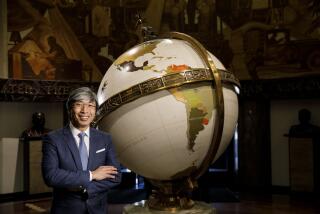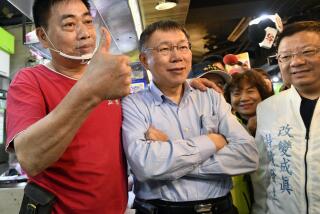Likely Hong Kong Chief Exec Is on a Roll
- Share via
HONG KONG — Shipping magnate Tung Chee-hwa--who is expected to be named Hong Kong’s first post-colonial ruler today--thought until recently that he was unqualified for the job.
Protesting that he was just a businessman and not a politician, and that he didn’t understand the aspirations of Hong Kong’s people, Tung, 59, waited until the last minute to declare himself a candidate to lead the territory after China reclaims it from the British on July 1.
But in the nearly two months since he joined the small circle of nominees for the top job, the once-discreet, press-shy tycoon has emerged as a charismatic candidate who strangely appeals to international leaders, Hong Kong people--and the powers in Beijing.
Swept away from a cheek-to-cheek pose with Miss Hong Kong 1996 by a crush of cameras, he laughed when asked if he still wanted the top post. “I’m learning. I’m getting used to it,” he said before his distinctive salt-and-pepper brush cut dissolved into the crowd.
No doubt it’s a difficult position. While the world watches, the first leader of post-1997 Hong Kong must balance the hopes of Hong Kong people, who will be testing new limits after the takeover, and the demands of Beijing, which values control above all else. He must reassure investors that Hong Kong will remain an international economic and legal refuge, while satisfying China that dissidents and those who disagree with Beijing’s policies on Taiwan and Tibet have no place here.
The intrigue of Tung is his apparent promise to pull it off.
From the January day he received a king-making handshake from Chinese President Jiang Zemin, to laudatory comments from Hong Kong’s British governor, Chris Patten, to his meeting last week with U.S. Assistant Secretary of State Winston Lord--who didn’t see the other two candidates--Tung repeatedly gleans endorsements from people who seem to agree on little else.
“He’s eager, affable, listens well and is smart. He knows everything about business,” said U.S. Sen. Dianne Feinstein, the California Democrat who has gotten to know Tung on trips through Hong Kong and during talks on China policy at the Center for Strategic and International Studies in Washington.
What is critical, she advised him on a recent trip here, is that he reach out to the average people and prove to them that he--not Beijing--will be running Hong Kong after the hand-over. “Ultimately,” Feinstein said, “that will make for his success.”
If nothing else, Tung is a fast learner. He has gone from a brusque, reluctant candidate to a man of the people. On televised visits to housing projects, he appropriates Patten’s best lines and greets throngs of well-wishers with the two-handed grasp that is President Clinton’s trademark.
The effort has paid off: Tung has switched top places in popularity polls with the likable but distant former Chief Justice Ti Liang Yang, 67, who announced his candidacy from a yacht. Banker Peter Woo, 50--who some say appears too slick for man-in-the-street appeal but was the first to open the campaign up to the public by publishing his platform--is at the bottom of the ratings.
But even as Tung walks the back streets of Hong Kong, his platform has been right in step with Beijing’s party line.
He has accused Hong Kong’s largest, most popular political group--the Democrats--of being anti-China. He has said the press should remain free but shouldn’t “go stirring up all that muck.” He thinks the Communist Party should be legalized in Hong Kong and that the territory “should be prepared to make sacrifices for China.”
“What he says would cause an uproar if it were coming from some stiff party member,” one observer said. “But somehow coming from his mouth, it seems nearly palatable.”
But at the end of the day, critics say, it is Beijing and its backers he must please. Whether Tung was anointed as China’s choice when Jiang singled him out for a handshake, many on the Selection Committee of 400--who themselves were chosen by China--believe it. And that makes it so.
The committee early today began picking Hong Kong’s chief executive by paper ballot. The first candidate of the three to receive 201 votes wins.
“The forecast for him is between 250 and 300 votes,” said Stanley Shen, Tung’s campaign advisor, three days before the selection. “It should be over by lunchtime.”
Many members of the Selection Committee hope so. They also serve as members of the Legislative Council and must race down the road to that group’s afternoon session, where two motions will be considered with Tung in mind: One is a no-confidence vote, sponsored by vocal democrat Emily Lau; the other is a vote of congratulations.
For Tung, the position of chief executive has special significance. He was born in 1937 on China’s Zhoushan Island, about 730 miles northeast of Hong Kong--one of the first pieces of Chinese land seized by the British, in 1841. Being chosen to oversee Britain’s hand-over of Hong Kong to China as chief executive will represent a sweet historical irony.
“My father used to teach me that I’m a Chinese and should be proud of it,” Tung said. “He also taught me to do worthwhile things.”
Tung is bound to China in less obvious ways, some fear, pointing to a Chinese bailout of his financially troubled family business in 1985. Orient Overseas, the family shipping empire, over-ordered during a slowdown in world trade in the 1980s and was about to default on almost $3 billion in loans.
Bankers insisted on an injection of new investment before refinancing, and after Taiwan rejected Tung’s appeal, China came to the rescue in the form of $120 million funneled through Hong Kong tycoon Henry Fok, in exchange for 8% of the company.
The Chinese backing was not disclosed until Tung announced his candidacy in October, a revelation that reinforced concerns that Tung may be in thrall to Beijing--if not financially, then out of patriotic gratitude for the last-minute rescue.
“Ask yourself,” one political observer said. “Why lend $120 million to a young businessman in a declining industry?”
Tung’s simple answer: “Good returns on the investment: Shipping picked up again.”
The company is back afloat and just christened six of the world’s largest container ships--former First Lady Barbara Bush last year smashed a champagne bottle across the bow of the vessel America. (Another ship in the fleet is called the California.)
Tung’s friends point to the company’s near-failure--and its turnaround--as a seminal episode. The dogged, cautious businessman slept just five hours a day and demanded the same labor from those around him, said Jeffrey E. Garten, a former U.S. undersecretary of commerce who helped restructure the shipping company while working for Shearson Lehman Bros. in 1985.
Garten, in Hong Kong for a two-day business trip, accepted Tung’s request to help with the deal--one of the largest restructurings ever. “I asked to go back to Tokyo to get some clothes,” recounted Garten in a 1994 speech in Hong Kong. “C.H., now my client, said no.”
Garten stayed for 18 months.
Vincent Cheng, an executive director of Hongkong Shanghai Bank who participated in the restructuring, said of Tung: “Turning around a company in that kind of industry is not easy. It makes me think that if Hong Kong is facing any difficulties in the future, he has the kind of steady nerve and stamina to see it through.”
More to Read
Sign up for Essential California
The most important California stories and recommendations in your inbox every morning.
You may occasionally receive promotional content from the Los Angeles Times.










